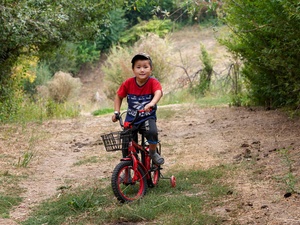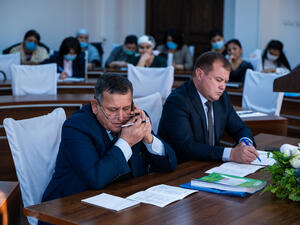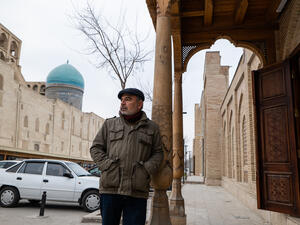Kyrgyzstan: Forcible return of four Uzbeks violates government agreement
Kyrgyzstan: Forcible return of four Uzbeks violates government agreement
We have been shocked to discover that four men who fled Uzbekistan in the wake of the explosion of violence in Andijan on 13 May were returned against their will yesterday, Thursday, from Kyrgyzstan. This is a direct violation of an agreement UNHCR had reached with the Kyrgyz government that no one would be forcibly returned unless they had been determined not to be a refugee after going through an asylum procedure. There had also been an agreement that UNHCR, which has an emergency team on the spot, would continue to have full access to these individuals during their detention.
The four, who are presumably now in the custody of the Uzbek authorities, are Dilshod Hadjiev, Tavakal Hadjiev, Abdubais (Hasan) Shakirov and Muhammad Kadyrov.
We are issuing an urgent appeal to the Kyrgyz government today to cease all further deportations of Uzbek asylum seekers until a proper procedure has been carried out to see whether or not they are refugees under the 1951 UN Refugee Convention. If they are refugees, then they cannot of course be deported.
If the four men were indeed refugees, - instead of "criminals" as repeatedly alleged by the Uzbek authorities - then their deportation would be considered refoulement (forcible return of a refugee to his or her homeland), which is prohibited under the 1951 Convention, to which Kyrgyzstan is a signatory. It is also specifically prohibited under Kyrgyz national law.
The return of these men may also be a violation of various other international treaties, such as the Convention against Torture.
Any evidence that they were common criminals rather than refugees fleeing persecution for their political or religious beliefs - or other grounds defined by the 1951 Convention - would need to be examined extremely carefully before they could be excluded from refugee status and returned to their home country.
We welcome a strong statement earlier this morning by the Kyrgyz Acting First Vice Prime Minister Felix Kulov condemning the deportations. Mr. Kulov also said there would be an investigation and that any state security officials who had acted improperly or illegally would be brought to justice.
Another 12 men remain under arrest in the town of Jalalabad, a few kilometres from the border with Uzbekistan, after being removed by Kyrgyz security forces from the new Sasyk camp to which they had been relocated only last weekend. The four deported men were also moved initially to Jalalabad, where UNHCR staff attempted to get access to all 16 of them on Thursday afternoon, but were refused permission by the National Security Force. After 24 hours, UNHCR staff were finally given access today around noon local time to the remaining 12 in the Jalalabad detention centre. They appeared very shocked, but otherwise in good health.
As you know, UNHCR applauded last weekend's relocation, as we believed the 470 or so Uzbek asylum seekers who had spent the previous month in a precarious position in a temporary camp right on the border between the two countries, should now be in a more secure situation.
However, as this week progressed, evidence began to emerge that the Uzbek authorities were still able to exert considerable pressure on the asylum seekers to return to Uzbekistan. Shortly after the previous camp, Barash, was abandoned last Saturday, a suspected Uzbek security officer was apprehended by Kyrgyz border guards as he sifted through belongings and papers left behind during the relocation.
Later, UNHCR staff saw two more Uzbek security officers driving a car with Andijan number plates in the vicinity of the new camp. As the week progressed more and more of the asylum seekers' relatives came to visit them in the camp and urge them to return home. They were clearly not acting entirely of their own free will, and these visits became increasingly emotional and problematic.









